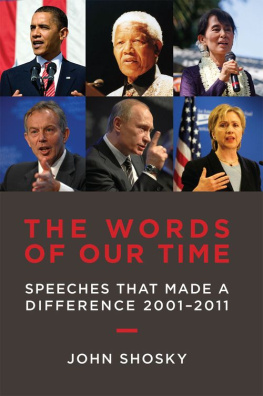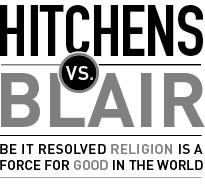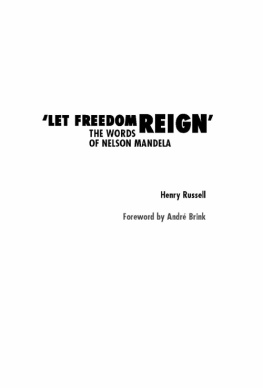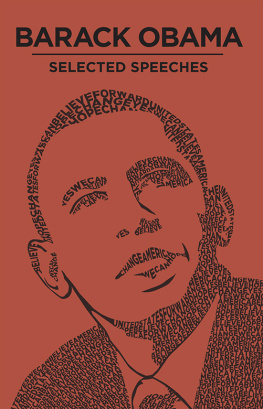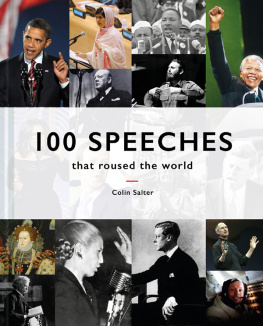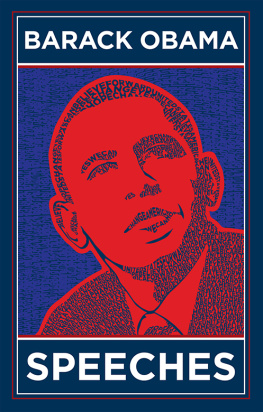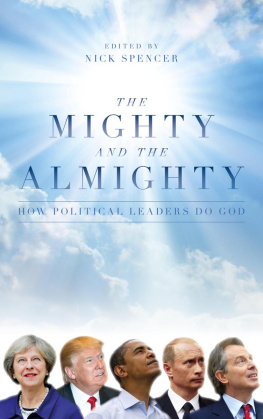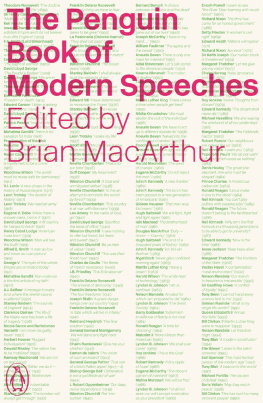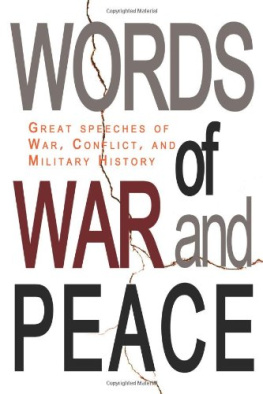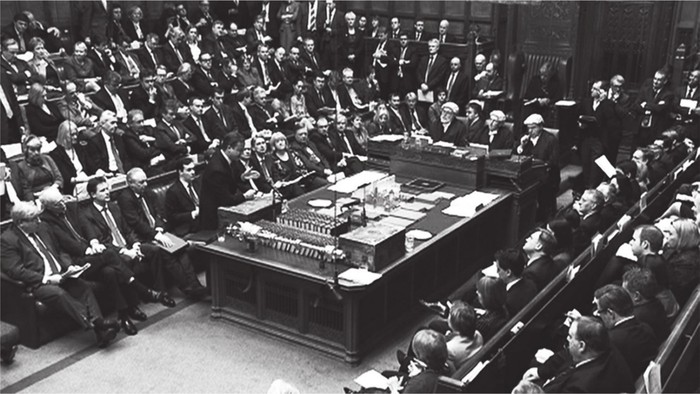Prime Minister David Cameron addressing the House of Commons, 2011.
TABLE OF CONTENTS
Aung San Suu Kyi: The hard life must be worthwhile
2010 remarks when freed from house arrest in Burma
Barack Obama: To form a more perfect union we can move beyond some of our old racial wounds
2008 Philadelphia speech about race, religion and politics
Vclav Havel: A sense of solidarity
2002 remarks about Cuba at Florida International University
Tony Blair: We are at our best when at our boldest
2002 Labour Party Conference speech
Tony Blair: Britain is not a follower. It is a leader
2007 resignation speech
Dan Hannan: A devalued Prime Minister, of a devalued government
2009 European Parliament speech
David Cameron: This country needs change
2010 Conservative Party Conference speech
Nick Clegg: We will not lose our soul
2010 Liberal Democrat Party Conference speech
Ed Miliband: The new generation of Labour is different
2010 Labour Party Conference speech
Nelson Mandela: Massive poverty and obscene inequality are the terrible scourges of our time
2005 London speech on global poverty
Ellen Johnson Sirleaf: The resilience of our people
2006 inaugural speech as Liberias President
Evo Morales: The confrontation of two cultures
2003 speech at conference in Mexico
Luiz Incio Lula da Silva: Hunger cannot wait
2003 speech at G8 Summit
Hugo Chavez: Yesterday, the devil came here
2006 speech at the United Nations
Vladimir Putin: History has given Russia a unique opportunity
2009 speech at Davos
Nicolas Sarkozy: A crisis of the denaturing of capitalism
2010 speech at Davos
Benazir Bhutto: The moving finger of history
2003 speech at World Political Forum
Manmohan Singh: We are building a new India
2010 Indian Independence Day speech
Henry M. Paulson, Jr: Chinas emergence as a global leader
2008 speech at National Committee for USChina Relations
Alphonso Jackson: Housing is central to the human condition
2007 speech in Macau
David Cameron: Britain remains a great economic power
2010 foreign policy speech at Lord Mayors Banquet
Michael Bear: We now live in a new world
2011 speech at Lord Mayors Dinner for the City of Londons Bankers and Merchants
George Osborne: The British dilemma
2011 speech at Lord Mayors Dinner for the City of Londons Bankers and Merchants
Ben Bernanke: This economic healing will take a while
2011 remarks to the Federal Reserve Bank of Kansas City Economic Symposium
David Cameron: To protect Britains national interests
2011 comments to the House of Commons after European Council meeting
George W. Bush: Either you are with us or you are with the terrorists
2001 speech before a Joint Session of Congress
Tony Blair: The kaleidoscope has been shaken
2001 Labour Party Conference speech
George W. Bush: The threat comes from Iraq
2002 Cincinnati speech
Robin Cook: The right of this place to vote
2003 resignation speech
Pope Benedict XVI: Faith and reason
2006 lecture on Christianity and Islam
Barack Obama: A new beginning
2009 University of Cairo remarks on USIslamic relations
David Cameron: We must build stronger societies
2011 Munich speech on multiculturalism
Mahmud Abbas: Worthy of a genuine state
2003 speech before the Palestinian Legislative Council
Binyamin Netanyahu: We want to see a parallel commitment
2010 speech in New Orleans on Israels security
Binyamin Netanyahu: Israel is what is right with the Middle East
2011 remarks before a Joint Session of Congress
Mahmud Abbas: We are at the heart of the Arab Spring
2011 remarks to the European Council
Douglas Alexander: The next decade of the Middle East is going to be defined by optimism
2011 remarks to the Royal United Services Institute on events in the Middle East
Hillary Clinton: The right side of history
2011 remarks to the National Democratic Institute concerning the Arab Spring
Amr Moussa: Vigorous Arab world in the years to come
2011 remarks to the International Institute for Strategic Studies
King Abdullah II of Jordan: The gates of the future
2011 remarks to World Economic Forum
Ronald Jan Heijn: The end of an era
2011 remarks at Occupy Amsterdam on the views and influence of the Occupy Movement
Slavoj iek: False terms, mystifying our perception
2011 remarks to Occupy Wall Street on legitimacy of Occupy protests
George W. Bush: Embryos are not spare parts
2006 remarks on stem cell policy
Diana DeGette: Ethical imperative to help cure diseases
2006 response to Presidential veto of stem cell legislation
Mitt Romney: Freedom and religion endure together, or perish alone
2007 speech on faith and American politics
Sarah Palin: A ground up call to action
2010 remarks to the inaugural Tea Party Convention
Chris Christie: Earned American exceptionalism
2011 remarks at Reagan Library about the up-coming American presidential election
John Howard: Unbearable grief and pain
2002 eulogy for Australian victims of Bali terrorist attack
Margaret Thatcher: Freedom and opportunity for ordinary people
2004 eulogy via video at Reagan funeral
Barack Obama: [Living] up to our childrens expectations
2011 eulogy for Tucson shooting victims, including Congresswoman Gabby Giffords
I first gave thought to the construction of speeches as a fourteen-year-old freshman at Roncalli High School in Pueblo, Colorado, a private Catholic school. The memories of that time linger, still fresh and alive.
It just shows how good teachers influence their students. My first speech teacher and mentor was Brother Al Blume, a great guy, who passionately loved rhetoric and public speaking. He had tremendous insight into the process of drafting and presenting speeches, talking with me for hours about words and techniques that made a speech stand out, becoming memorable. We met in a practice room and I would give a speech on a topic he assigned. Then we would analyse it together. We did this every week, sometimes every day. I made notes on yellow three-by-five cards, some of which I still have in my files or tucked away in books. Brother Al had suffered a stroke, so the words came with difficulty. But he carried on, even though each word he spoke was a painful act of will. There was great insight in those words, a true recognition of the power of persuasion.
His instruction was enhanced, magnified and quickly pushed into action by Brother Peter Loehr, a towering figure in my life, who understood the vast impact of great speeches. Brother Peter was in charge of our debate team and its amazing coaching staff, which included the legendary Homer Bisel, who had won a national championship, and his wife, Ruth, who taught us the humanity of public speaking. Richard Amman was a wonderful coach, too. He seemed able easily and competently to handle any aspect of instruction. Some of the students were good role models, like my heroes Bill Davis and Steve Henson.
Brother Peter took us to tournaments where we were fortunate to compete against talented speakers from other schools, teams from all over Colorado, and sometimes from other states. It was a process of trial by fire, learning by doing, slowly overcoming fear and ignorance. He was the first person who made me realise the profound power of a great speech, how the right words could instantly change the world. His guidance on preparation and reading spilled over into wide-ranging recommendations. I remember one day, the last day of the school year, he encouraged me, in my mothers presence, to read more demanding novels. He made it a personal challenge, telling me I could accomplish more and learn more quickly. I had already read some classics by Bram Stoker and Herman Melville, which I thought was pretty good going at my age. But I gravitated to political or economic texts. He wanted me to develop a love of literature. So Brother Peter recommended Boris Pasternak, Leo Tolstoy, Jack London and others, a turning point in my life. In particular, I will be forever grateful for his mentioning Pasternak, as

